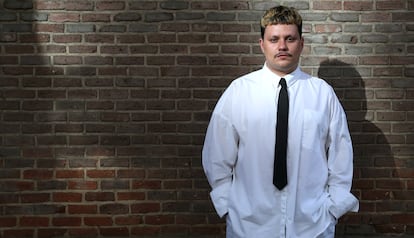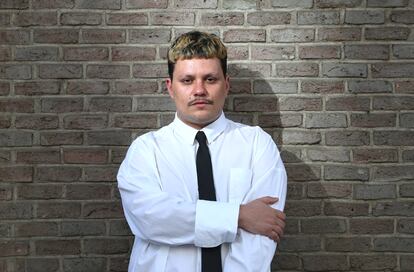Juanpe Sánchez López, writer: ‘Calling a relationship toxic prevents us from improving it and forgiving’
In his academic essay ‘Superemotional,’ the researcher defends love and critiques the language and rhythm with which we treat it

Juanpe Sánchez López has not forgotten the lesson of 2020. At the time, he was studying literature, and he had intended to spend that year outside of Spain. The ambition came face to face with reality: “Then the post-pandemic began and I realized that I would have been completely sad if I had left,” he recalls today, now a researcher at the Autonomous University of Madrid. “There is an essential moment when you realize that life is not what you are doing, but who you are doing it with.”
Sánchez López decided then to dedicate his literary output to love. He first wrote a collection of poems on the topic, and now he has published Superemocional an academic essay in defense of love in this battered world. In its 17-page bibliography, thinkers such as Lévi-Strauss and Durkheim intersect with passages from Twilight, comics by Liv Strömquist, episodes of Girls and lyrics by Lorde.
Question. What did you need to defend love from?
Answer. I think we need to redefine the metaphors we use to talk about it. The idea of the toxic, for example, in the end comes from what makes you sick, from poison. To label a relationship as toxic is to impregnate it with the image of something that is going to kill you. That prevents there being a possibility of forgiveness, of being cured of that poison. What is the remedy for toxicity? Ending the relationship.
Q. If that’s the right thing to do…
A. What is right for each person? It is psychologists’ great question. It’s good for you to end with the toxic person because you don’t want to poison yourself anymore. But that leaves you in a place of non-commitment to the things that matter to you, with the impossibility of forgiving or improving that relationship that perhaps could improve.
Q. With how easy it is to flirt on Tinder, Grindr, having these liquid relationships, as Zygmunt Bauman calls them, isn’t a timely withdrawal a victory?
A. Everything comes to an end. Is that better than when they couldn’t end? Yes. On the other hand, everything seems to end because we are on an application, and if I don’t like you, I’ll go with another person. Yes, things end. But they still matter to us.
Q. Do we put too much emphasis on the idea that love shouldn’t hurt?
R. It is extremely important to accept that we are vulnerable beings and that we are going to suffer. [The French-Israeli sociologist and writer] Eva Illouz argues that we have become entrepreneurs of ourselves, making ourselves profitable, and we do not accept suffering even in our relationships. But how are you not going to suffer in life if, no matter how well things go for you and no matter how much you love yourself, in the end people do things that you don’t expect and that are going to hurt you? That pain does not have to be qualified as positive, nor as negative, nor as even useful. It’s just another emotion. I actually remember the first months I fell in love with my boyfriend. It hurt a lot.

Q. Really?
A. It hurt a lot.
Q. What hurt?
A. That it could end at any moment and I didn’t want it to end. I said to myself: ‘What is this emotion telling me? That I care. And if I care, I’m going to make it work.’
Q. Romantic love was presented to us as something almost religious, detached from the earthly. Does that still stand?
A. We live in a capitalist system of speed, precariousness and overwork. Byung-Chul Han’s essay on this is famous. The life that we have left is dedicated to rest so we can continue working, because if you are not rested then you cannot give up. It is very difficult to find spaces to dedicate to what you like, to the people you love. What do we have left? I don’t know.
Q. Me neither.
A. There is some potential in becoming aware that we are tired and why, in seeing, in these moments when you clear your head and are with the people they love, glimpses of the life you want to live.
Q. Are we too tired to love well?
A. We are told that we have to work on our emotions, which is tricky. How do we work on emotions? They aren’t merchandise. You can invest time in them... but work on them? Nobody wants to work more, to come home after 40 hours of work with the feeling that an Excel of emotions awaits them, just like nobody wants to poison themselves with something toxic. We shouldn’t stain love with languages that hurt us. If we carry this language into our relationships, no one will want to be in them.
Q. The rock group Amaral sang, “Without you I am nothing.” A regrettable philosophy?
A. Nope! There was some criticism at the beginning of the 2000s from certain feminist sectors who said that the song spoke of absolute surrender and that, therefore, it was toxic or harmful; that it proposed a model of love in which the woman, or at least the subject who sang the song, who is feminine, was in complete surrender, as in a bond of slavery. But we are interdependent beings, we depend on others and on everything else to exist. “Without you I am nothing” is totally fine. It is also okay for us to say that in a love relationship we depend on others. It should be that way.
Q. Has the way we talk about love changed?
A. With feminism, there has been an insistence on the importance of chosen family ties and friendships. That is changing our way of seeing love.
Q. Like when romantic love supplanted medieval marriages?
A. Romantic love, inevitable Twilight-style love, meant that the marriage ceremony ceased to be a group interest and began to be looked at for the interest of an individual or couple. The model with the one we live in today, where there is also romantic love, includes relationships based on uncertainty, haste, the idea that the self is something that can be improved through another person, both of whom are commodified. Individual freedom is valued, and there is very little emotional involvement in these relationships. The myths of romantic love have been deeply criticized: there were structures of domination and oppression that hurt women above all. In the same way, this new model presents unsustainable, violent characteristics and dynamics that harm us. In that sense they are comparable.
Q. You offer a very specific definition of love: “bathe, feed, protect,” but also “invite to a party.”
A. I take from feminism the idea that, in order to produce a good life, we have to be cared for. The impulse to care comes from loving, and loving is paying attention to others. Bathing, feeding, and cleaning are forms of care, but they are very basic. That definition must be extended to everyday life: call someone, talk to someone, invite someone to a party, tell someone that they are attractive, that you like how they think. Look at them carefully. I feel that our gaze is focused on our work, our success, our future. And we don’t realize that the things that make that possible are other things that are here and that are always happening, like being with others. And without that, why do you want to be successful? What do you want to work for?
Sign up for our weekly newsletter to get more English-language news coverage from EL PAÍS USA Edition
Tu suscripción se está usando en otro dispositivo
¿Quieres añadir otro usuario a tu suscripción?
Si continúas leyendo en este dispositivo, no se podrá leer en el otro.
FlechaTu suscripción se está usando en otro dispositivo y solo puedes acceder a EL PAÍS desde un dispositivo a la vez.
Si quieres compartir tu cuenta, cambia tu suscripción a la modalidad Premium, así podrás añadir otro usuario. Cada uno accederá con su propia cuenta de email, lo que os permitirá personalizar vuestra experiencia en EL PAÍS.
¿Tienes una suscripción de empresa? Accede aquí para contratar más cuentas.
En el caso de no saber quién está usando tu cuenta, te recomendamos cambiar tu contraseña aquí.
Si decides continuar compartiendo tu cuenta, este mensaje se mostrará en tu dispositivo y en el de la otra persona que está usando tu cuenta de forma indefinida, afectando a tu experiencia de lectura. Puedes consultar aquí los términos y condiciones de la suscripción digital.









































